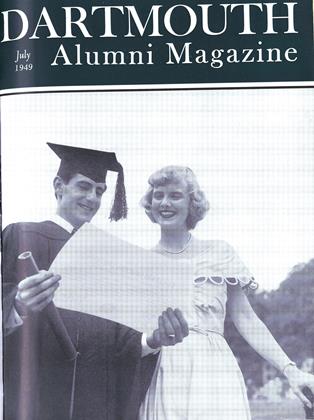MR. PRESIDENT: We are profoundly grateful to Dartmouth for these great honors; and we hope the Class of 1949 will permit us to express our gratitude in becoming synthetic members of it "the easy way."
Many years ago I was attracted to Dartmouth by its great and rare traditions. It has long since ceased to be "the small college" which Daniel Webster immortalized. But I hope it may never cease to commune with the great American spirit—the great exemplar of Constitutional fidelities—who thus added deathless luster to its fame.
This is a reminiscent day for me. Twenty-one years ago this month my only son was a graduate with the Class of 1928 —as the result of a final and necessary academic spurt. I had just been appointed to the United States Senate. The Republican National Convention was meeting in Kansas City. My son was graduating that same week in Hanover. I had to choose between the two. I chose Dartmouth. And now, 21 years later I am here again.
I have just one suggestion to leave with you in this very brief moment when I intrude upon your program.
We sometimes hear that young America no longer confronts the rich opportunities for service which existed in the old pioneer days when new frontiers beckoned to new careers. In my opinion there never was a time in our history when so many "frontiers" are begging for new "pioneers" to master them. I mention only one.
By sheer force of inexorable events, the United States has become the dominant influence, for weal or woe, in the life of the world. Even if we wished, we can no longer live unto alone. Our "frontiers" of responsibility and leadership—and comparable hazard—no longer shrink comfortably behind two oceans which once were moats around our bastions. They extendwhether we like it or not—into the seven seas. They extend into the life of freedom everywhere. We are the stewards of democratic justice. We are the trustees of honorable peace.
No previous generation o£ young Americans ever confronted such a call to "pioneers." Upon our intelligent and courageous leadership, in this shattering atomic age, the shape of destiny itself may well depend. Let me give you my swift view of it.
I venture to assert that this leadership must never falter in its devotion to those human rights and those fundamental freedoms which are the rich, accumulated heritage of Western Civilization. We must never compromise with the vice of tyranny at home or abroad—whether Communist or Fascist or whatever guise this despotism may wear. We must always remember that appeasement is simply surrender on the installment plan. We must never forget the lesson of the fable that it does no good for the sheep to meet and pass resolutions in favor of vegetarianism so long as hungry wolves plan otherwise.
On the other hand, I venture also to assert that our aim should be a "live and let live" world in which there is room for every people to choose their own way of life for themselves. Our aim should be collective peace through collective security in the spirit and the pattern of a United Nations which is made to work.
There is no need for this ugly and insane thing called "war" if—lF—we make it irresistably and collectively plain that armed aggression never again is going to be allowed to "divide and conquer" the victims of its appetites; and if, at the same time, we make it equally plain that we of theUnited States have no remote thought of any sort of conquest in our souls and no aspiration except honorable, just, unshackled, reliable peace in a free world of free men.
Permanent, durable peace with justice is the greatest of all these new "frontiers" which beckon to the diploma-pioneers of 1949.
Again, Mr. President, we present our deepest gratitude to Dartmouth for the honor it has done us this morning, and our affectionate respects and good wishes to our Class of 1949.
THREE NATIONAL CELEBRITIES who received honorary LL.D. degrees at Dartmouth's 180 th Commencement shown with President Dickey. Left to right, John L. Sullivan '21, former Secretary of the Navy; President Dickey; Charles E. Wilson, president of General Electric; and Arthur H. Vandenberg, U. S. Senator from Michigan. Seven others also received honorary degrees.
Senator Arthur H. Vandenberg of Michigan, recipient of the honorary LL.D. degree at Dartmouth's 180 th Commencement, spoke briefly at the exercises in theBema, responding in behalf of the honorary-degree group immediately after theconferring of their degrees. Following is anearly complete report of his remarks,based on the notes he kindly presented tothe College by request.
 View Full Issue
View Full Issue
More From This Issue
-
 Class Notes
Class Notes1929 Sets Record at 20th
July 1949 By F. WILLIAM ANDRES '29, -
 Class Notes
Class Notes1930 Holds Advanced 20th
July 1949 By ALEX J. McFARLAND, -
 Class Notes
Class NotesA Memorable 45th for 1904
July 1949 By DAVID S. AUSTIN II '04, -
 Article
ArticleThe 180th Commencement
July 1949 -
 Class Notes
Class Notes1939's Tremendous Tenth
July 1949 By CLEMENT F. BURNAP '39, -
 Class Notes
Class Notes1924's Big Twenty-Fifth
July 1949 By C. N. ALLEN '24
Article
-
 Article
ArticlePROFESSORS PHELPS AND BEARD TO GIVE 1922 ALUMNI LECTURES
April, 1922 -
 Article
ArticleCouncil Nominations
February 1940 -
 Article
ArticleShow Tide of Action In Each Quarter
December 1940 -
 Article
ArticleInsurance President
May 1956 -
 Article
Article'57 Fund Shoots for New Records
April 1957 -
 Article
ArticleFaces to Watch
Jan/Feb 2004 By Julie Sloane '99


